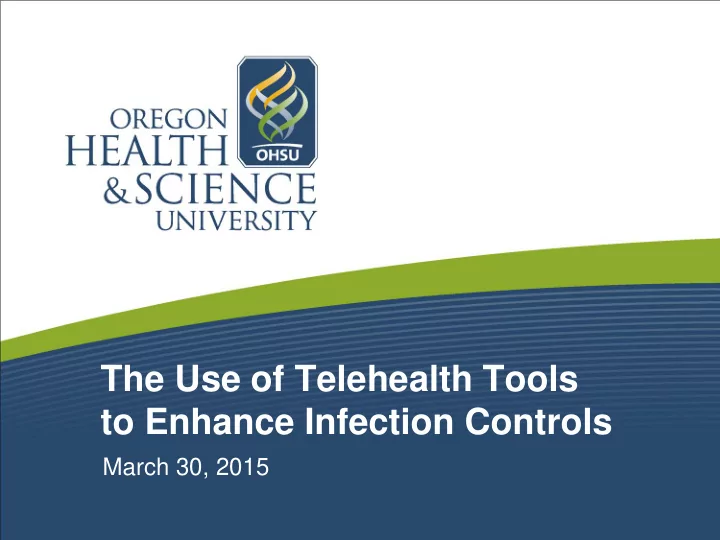

The Use of Telehealth Tools to Enhance Infection Controls March 30, 2015
Disclosures None.
OHSU Overview Hospital Summary Located in Portland, Oregon 576 Beds 2861 Students
OHSU Overview IT Infrastructure 72,000 Networked Devices 2,460 Wireless Access Points 492 Physical Servers 1,796 Virtual Servers 17,000 Networked Computers (Data Center West) 3,000 Networked Printers 14,000 Telephones 30,000 E-mail Accounts 2,843 Databases 3 Petabytes Storage 2 Data Centers 125 Buildings & 5,640,000 Square Feet Serviced
OHSU Overview Telehealth Program began 2007 27 Sites Service Lines Stroke, PICU, NICU, Genetics, Trauma, Neurosx, Psychiatry In-Home Care
Telehealth Engineering Innovation through Improvisation Know your toolbox Adapt known technologies Focus on interoperability and scalability
August 2014 Infected Ebola Caregivers Arrive in US for Treatment Treatment conducted at established centers Hospitals educate IC/Hygiene best practices Occurs in a detached reality media bubble
October 2014 The Bubble Breaks First US cases diagnosed Media panic ensues Hospitals now on Ebola-watch Infection Control protocols are re-evaluated Additional resources sought
Infection Control IT Resources Evaluation Telehealth for enhanced communications? Device selection Protection and decontamination Footprint in EB space
Infection Control The Unit Designated on-call “EB” space Reverse pressure room in the MICU Limited space Nearby team room
Infection Control Existing Tools Physical barriers Clumsy at times Truly Analog
Infection Control The Telehealth Toolbox Communications (Clinical and Family) Diagnostic Imaging Patient Monitoring
Infection Control Non-Telemedicine IT Tools Wireless monitoring Mobile Apps Degowning robots HUD/”Glass” tools to bring screens inside PPE
EB Drills at OHSU Drills were primarily for staff readiness Telemedicine tools placed on-site
EB Drills at OHSU Telemedicine Tools Intouch RPLite Avizia CA700 3M Littmann Stethoscope “EB” Laptop
EB Drills at OHSU Findings Quick deployment Technology was intimidating at first Ad Hoc clinical presence Off-Site intervention options
Hospital Preparedness Outfitting Units Define Clean and Contaminated Spaces Pre-set Key Infrastructure Validate Network Connectivity Familiarize Tech Teams with Location Define the workflow
Hospital Preparedness Clean Team Deployment Define the storage location and access Preconfigure existing infrastructure Compile complete equipment inventory On-site staffing of the tools
Hospital Preparedness Contamination Team Deployment Define the storage location and inventory Preconfigure and test when possible Equipment positioning in space Know diagnostic equipment connections PPE training for IT staff
No Ebola in Portland But… The EB scenario proved an effective setting to develop Telehealth and IT based infection control tools.
Findings Takeaway #1 Decide on the importance of preserving the IT tools Know what is expendable
Findings Takeaway #2 Normal IT rules can be broken (within reason) Scalability and Interoperability not important Consumer IT tools should be considered
Findings Takeaway #3 Know your on-site diagnostic connectivity Itemize necessary cabling
Findings Takeaway #4 Develop a set of IT “Go-Bags” Clean Room Kit Contaminated Room Kit • Bluetooth receiver for stethoscope • Bluetooth stethoscopes • Cheap tablet preloaded to access • Cheap tablet preloaded to access medical records, EPI Info software medical records, EPI Info software from CDC, stream doffing and from CDC, stream doffing and gowning videos gowning videos • Teleconferencing receiving equipment • Wearable device for video streaming • Written instructions on how to receive • Wireless pulse oximeter, heartrate and the wireless medical device readings blood pressure cuff
Conclusions Telemedicine tools are an excellent complement to infection control protocols The experience informed hospital administration of the value of these tools for infection control
Collaborators Kyle Hall Telehealth Coordinator Nebraska Medical Center Rachel James Security Engineer Oregon Health & Science University
Questions or Comments? Thank You!
Recommend
More recommend